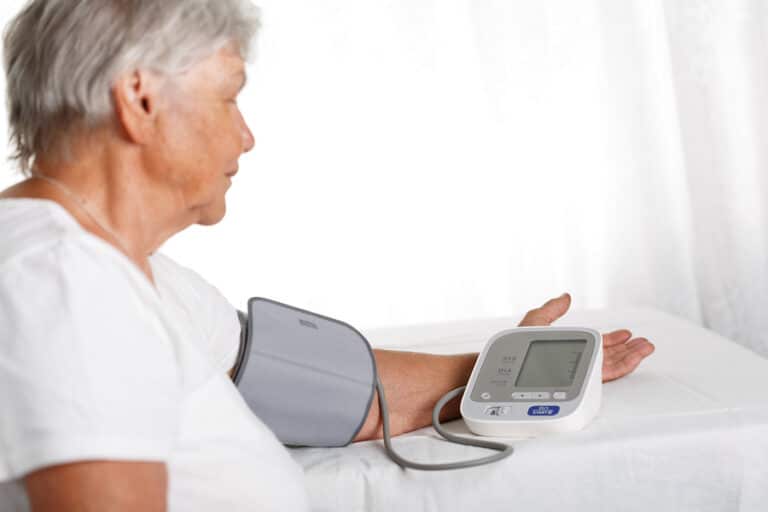What is blood pressure?
Blood pressure is the force of blood pushing against the walls of our arteries. Normal blood pressure for adults is defined as a systolic pressure of less than 120 and a diastolic pressure of less than 80. This is measured by a doctor and stated as 120/80.
For seniors, the first number (systolic) is often measured at 130 or higher, but the second number (diastolic) is less than 80. This is called isolated systolic hypertension, a problem caused by age-related stiffening of the major arteries. This is the most common form of high blood pressure in elderly people and can lead to several major health problems such as heart disease, stroke, eye problems, or kidney failure. It can also be responsible for seniors experiencing shortness of breath, even during light exercise, as well as falls and the feeling of being lightheaded upon standing.
Having high blood pressure is very common in seniors, as the risk increases with age after the vascular system starts to change causing arteries to stiffen which raises the pressure of the blood.
What can be done for treatment?

Blood pressure can be controlled in most people through lifestyle changes that can be incorporated into their senior care routine.
Some ways to lower their risk and control blood pressure are:
Eat a nutritious diet rich in vegetables, fruits, whole grains and low-fat dairy products that may help lower blood pressure. Salt intake should be lowered, as seniors become more sensitive to sodium in the body. Your senior’s caregivers can help to ensure that they are eating the types of foods that they need and avoiding the ones they shouldn’t consume in order to enrich their diet and keep them healthy.
Have a daily exercise routine, and check with their doctor about what level of activity is right for them based on their age, health, and mobility. Even those receiving senior care at home can find ways to incorporate movement into their daily life.
Maintain a healthy weight. People that are overweight are at greater risk of high blood pressure and other weight-related ailments. Ask your senior’s doctor if you are unsure what weight is normal for their age and body type.
Eliminate alcohol and nicotine, which can negatively affect blood pressure and increase the risk for heart disease and stroke as well as high blood pressure.
Manage stress and practice good sleep habits. If your senior snores when they sleep, this may be a sign of sleep apnea and should be discussed with their healthcare practitioner. Treatment of sleep apnea can help lower blood pressure and enable your senior to get much better sleep. Learning to relax, like developing a meditation practice, can also be beneficial in decreasing stress, which also lowers the risk of high blood pressure. This is something that people in senior care can do from their own home.
If non-pharmacologic options have not been successful in lowering the blood pressure of your loved one, medications can be prescribed by their physician. Be sure to look at the risks and side effects, as well as discuss other medications your senior may be taking before starting any new medication regimen and remember to have their blood pressure monitored regularly.
If you or an aging loved one are considering hiring Senior Care in Simpsonville, SC, contact Heart of the Carolinas Home Care at 864-991-3116. Providing Home Care Services in Greenville, Simpsonville, Greer, Anderson, Spartanburg, Mauldin, Seneca, Laurens, Charleston, Columbia and the surrounding areas.
Source:
https://www.nia.nih.gov/health/high-blood-pressure
https://www.acc.org/latest-in-cardiology/articles/2015/02/19/14/55/on-hypertension-in-the-elderly
- Is it Possible to Prevent Family Caregiver Burnout? - April 25, 2025
- Home Care Assistance Helps Seniors After A Fall - April 9, 2025
- How Home Care Supports Seniors Who Are Hard of Hearing - March 28, 2025

